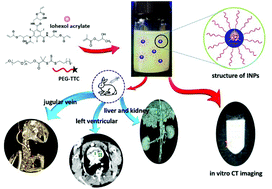Polymerization-induced self-assembly of large-scale iohexol nanoparticles as contrast agents for X-ray computed tomography imaging†
Abstract
X-ray computed tomography (CT) is one of the most useful imaging technologies in the clinic. To increase the sensitivity of CT, iodinated compounds are used as injectable contrast agents. Unfortunately, the rapid renal clearance results in a narrow imaging window for diagnosis. In addition, the non-specific distributions and high osmolality of small molecules may induce serious adverse effects. However, nanoparticles can substantially overcome these limitations. As a result, developing new iodinated nanoparticles with high feasibility and availability as contrast agents is highly demanded for CT diagnosis. Herein, we reported fundamental research with a one-pot strategy for the synthesis of iohexol nanoparticles (INPs) on a large scale via polymerization-induced self-assembly (PISA) for CT imaging. The crosslinked core of INPs can increase the loading efficiency of iohexol to 36.5%, yielding sufficient contrast in CT imaging. Moreover, the stability of INPs was enhanced significantly via the core-crosslinking, allowing a good dispersion even in an extremely high concentration (120 mg mL−1). Compared to iohexol, the INPs showed a longer circulation time, negligible toxicity, analogous imaging capability and prominent accumulation in tumors. With these advantages, INPs could become better alternative contrast agents for cancer diagnosis and angiography in vivo.



 Please wait while we load your content...
Please wait while we load your content...